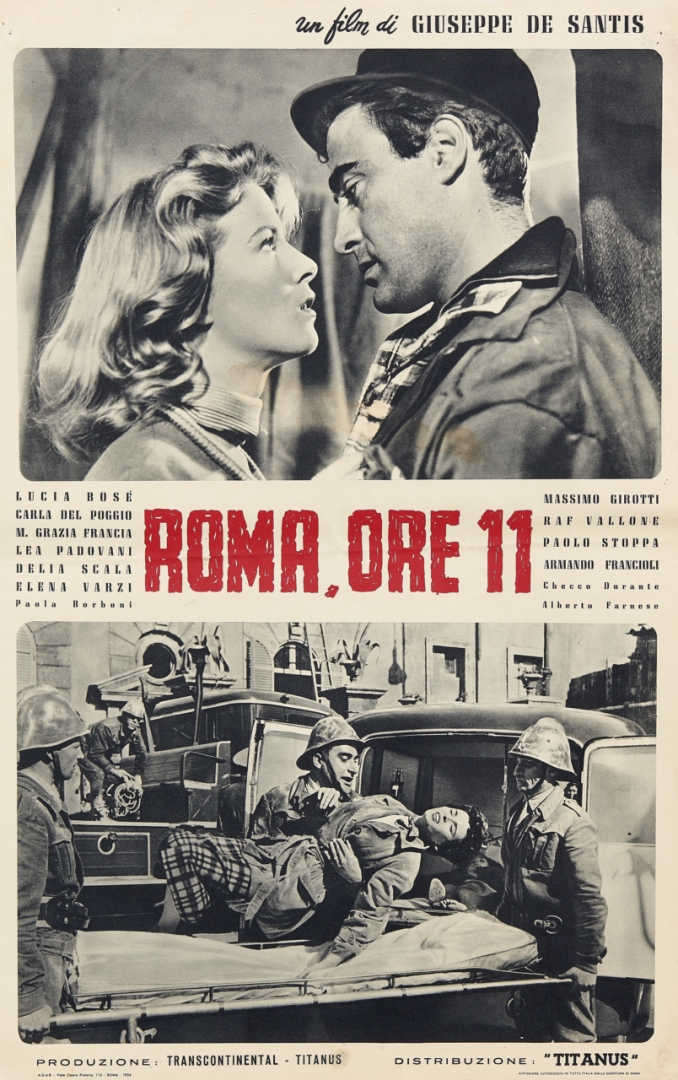One of the greatest masterpieces of Italian neorealism, which still amazes with its modernity
A real-life tragedy, reconstructed by Giuseppe De Santis
After having elaborated his own personal version of neorealism in his explorations of rural life (Caccia tragica, Riso amaro, Non c’è pace tra gli ulivi), Giuseppe De Santis then confronted a primarily urban story with the same cinematic rigour and excellence. The film is based on a real-life tragedy that occurred in Rome, which the director, encouraged by Cesare Zavattini, decided to bring to the big screen. In so doing, it enabled him to continue his thesis on post-war Italy, work and the condition of women, all themes he had dealt with previously to great success. To capture the reality of events with the utmost precision, before shooting began De Santis entrusted a young Elio Petri (later destined to have an extraordinary career behind the camera) with the task of carrying out a painstaking investigation into the facts. On the basis of the interviews carried out by Petri and his reconstruction (which will later be published and still today remains an engaging read), the screenplay recounts events using a multitude of protagonists. From time to time, focus is shifted onto one specific individual in the film’s exploration of the living conditions of women from a range of backgrounds brought together because of a common need, without ever losing sight of the overall picture. In its meticulous precision and narrative fluidity, De Santis shows an absolute mastery of the material, giving life to an incredibly modern film that still has the power to amaze, with a cast of the highest quality: Lucia Bosè, Carla Del Poggio, Maria Grazia Francia, Lea Padovani, Delia Scala, Raf Vallone, Massimo Girotti, and many more worth mentioning.
Following the publication of a classified ad in a newspaper, 200 girls from all sorts of backgrounds show up in Rome for a job as a typist. While they wait to be interviewed, the girls share opinions and tell life stories. But the collapse of a stairs will result in a tragedy.
One of the greatest masterpieces of Italian neorealism, which still amazes with its modernity
A real-life tragedy, reconstructed by Giuseppe De Santis
After having elaborated his own personal version of neorealism in his explorations of rural life (Caccia tragica, Riso amaro, Non c’è pace tra gli ulivi), Giuseppe De Santis then confronted a primarily urban story with the same cinematic rigour and excellence. The film is based on a real-life tragedy that occurred in Rome, which the director, encouraged by Cesare Zavattini, decided to bring to the big screen. In so doing, it enabled him to continue his thesis on post-war Italy, work and the condition of women, all themes he had dealt with previously to great success. To capture the reality of events with the utmost precision, before shooting began De Santis entrusted a young Elio Petri (later destined to have an extraordinary career behind the camera) with the task of carrying out a painstaking investigation into the facts. On the basis of the interviews carried out by Petri and his reconstruction (which will later be published and still today remains an engaging read), the screenplay recounts events using a multitude of protagonists. From time to time, focus is shifted onto one specific individual in the film’s exploration of the living conditions of women from a range of backgrounds brought together because of a common need, without ever losing sight of the overall picture. In its meticulous precision and narrative fluidity, De Santis shows an absolute mastery of the material, giving life to an incredibly modern film that still has the power to amaze, with a cast of the highest quality: Lucia Bosè, Carla Del Poggio, Maria Grazia Francia, Lea Padovani, Delia Scala, Raf Vallone, Massimo Girotti, and many more worth mentioning.
Following the publication of a classified ad in a newspaper, 200 girls from all sorts of backgrounds show up in Rome for a job as a typist. While they wait to be interviewed, the girls share opinions and tell life stories. But the collapse of a stairs will result in a tragedy.
